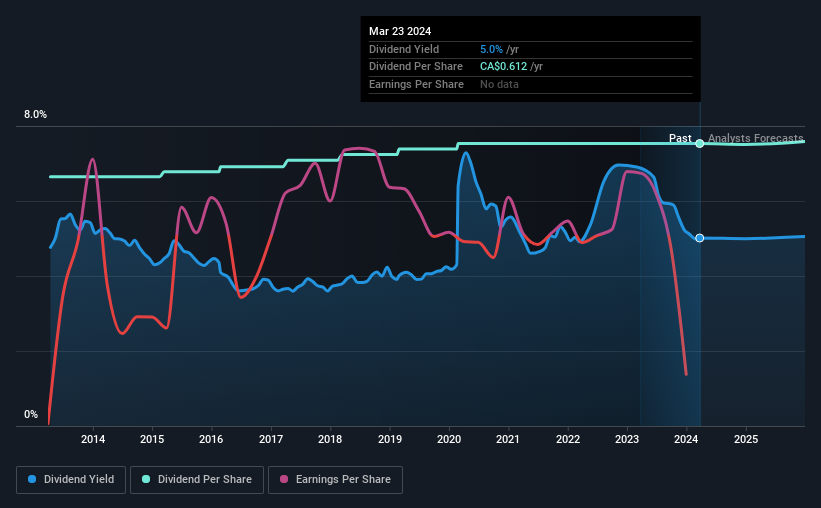Why It Might Not Make Sense To Buy Chartwell Retirement Residences (TSE:CSH.UN) For Its Upcoming Dividend
Chartwell Retirement Residences (TSE:CSH.UN) stock is about to trade ex-dividend in three days. The ex-dividend date is usually set to be one business day before the record date which is the cut-off date on which you must be present on the company's books as a shareholder in order to receive the dividend. The ex-dividend date is of consequence because whenever a stock is bought or sold, the trade takes at least two business day to settle. Thus, you can purchase Chartwell Retirement Residences' shares before the 27th of March in order to receive the dividend, which the company will pay on the 15th of April.
The company's upcoming dividend is CA$0.051 a share, following on from the last 12 months, when the company distributed a total of CA$0.61 per share to shareholders. Calculating the last year's worth of payments shows that Chartwell Retirement Residences has a trailing yield of 5.0% on the current share price of CA$12.21. If you buy this business for its dividend, you should have an idea of whether Chartwell Retirement Residences's dividend is reliable and sustainable. So we need to check whether the dividend payments are covered, and if earnings are growing.
Check out our latest analysis for Chartwell Retirement Residences
Dividends are typically paid from company earnings. If a company pays more in dividends than it earned in profit, then the dividend could be unsustainable. Chartwell Retirement Residences reported a loss last year, so it's not great to see that it has continued paying a dividend. With the recent loss, it's important to check if the business generated enough cash to pay its dividend. If cash earnings don't cover the dividend, the company would have to pay dividends out of cash in the bank, or by borrowing money, neither of which is long-term sustainable. It paid out more than half (70%) of its free cash flow in the past year, which is within an average range for most companies.
Click here to see the company's payout ratio, plus analyst estimates of its future dividends.
Have Earnings And Dividends Been Growing?
Companies with falling earnings are riskier for dividend shareholders. Investors love dividends, so if earnings fall and the dividend is reduced, expect a stock to be sold off heavily at the same time. Chartwell Retirement Residences was unprofitable last year and, unfortunately, the general trend suggests its earnings have been in decline over the last five years, making us wonder if the dividend is sustainable at all.
The main way most investors will assess a company's dividend prospects is by checking the historical rate of dividend growth. Since the start of our data, 10 years ago, Chartwell Retirement Residences has lifted its dividend by approximately 1.3% a year on average.
Get our latest analysis on Chartwell Retirement Residences's balance sheet health here.
The Bottom Line
Has Chartwell Retirement Residences got what it takes to maintain its dividend payments? First, it's not great to see the company paying a dividend despite being loss-making over the last year. On the plus side, the dividend was covered by free cash flow." Overall it doesn't look like the most suitable dividend stock for a long-term buy and hold investor.
With that in mind though, if the poor dividend characteristics of Chartwell Retirement Residences don't faze you, it's worth being mindful of the risks involved with this business. To help with this, we've discovered 2 warning signs for Chartwell Retirement Residences that you should be aware of before investing in their shares.
Generally, we wouldn't recommend just buying the first dividend stock you see. Here's a curated list of interesting stocks that are strong dividend payers.
Have feedback on this article? Concerned about the content? Get in touch with us directly. Alternatively, email editorial-team (at) simplywallst.com.
This article by Simply Wall St is general in nature. We provide commentary based on historical data and analyst forecasts only using an unbiased methodology and our articles are not intended to be financial advice. It does not constitute a recommendation to buy or sell any stock, and does not take account of your objectives, or your financial situation. We aim to bring you long-term focused analysis driven by fundamental data. Note that our analysis may not factor in the latest price-sensitive company announcements or qualitative material. Simply Wall St has no position in any stocks mentioned.

